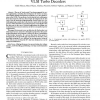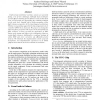71 search results - page 9 / 15 » Efficiency and Reliability of DNA-Based Memories |
TVLSI
2002
13 years 7 months ago
2002
Abstract--The use of "turbo codes" has been proposed for several applications, including the development of wireless systems, where highly reliable transmission is requir...
ICDCS
1998
IEEE
13 years 11 months ago
1998
IEEE
In this paper, we quantify the adverse effect of file sharing on the performance of reliable distributed applications. We demonstrate that file sharing incurs significant overhead...
ICCD
2002
IEEE
14 years 4 months ago
2002
IEEE
Fault-tolerant distributed real-time systems are presently facing a lot of new challenges. Although many techniques provide effective masking of node failures on the architectural...
HCW
1999
IEEE
13 years 11 months ago
1999
IEEE
The MILAN project, a joint effort involving Arizona State University and New York University, has produced and validated fundamental techniques for the realization of efficient, r...
ASPDAC
2007
ACM
13 years 11 months ago
2007
ACM
Clock skew scheduling is a technique that intentionally introduces skews to memory elements to improve the performance of a sequential circuit. It was shown in [21] that the full ...


